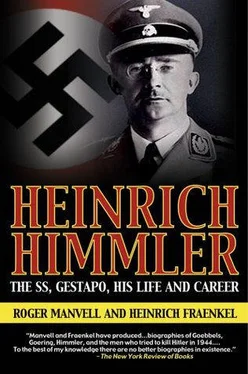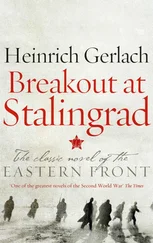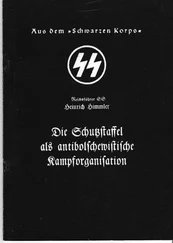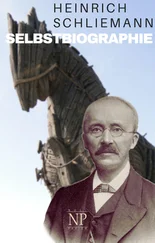Himmler’s senior officers remained in their separate orbits, planets to Himmler’s sun — S.S. General Ernst Kaltenbrunner, appointed head of the Reich Security Office in 1943, S.S. General Mueller, head of the Gestapo, S.S. General Pohl, head of the economic administration of the S.S. and inspector of the concentration camps, and S.S. Lieutenant-General Schellenberg, Chief of Foreign Intelligence, who was now to become Himmler’s closest political adviser. He also had his retinue of specialized advisers, such as Korherr, who combined the handling of statistics with the provision of secret reports on the other S.S. leaders. This led to his being beatenup in August 1943.
In appointing Kaltenbrunner head of the Reich Security Office on 30 January 1943, Himmler made a grave error. Apparently he brought him from Vienna, where he had been Higher S.S. Police Leader for several years, because he thought a stranger would be more tractable than one of his nearer subordinates. Kaltenbrunner, though a stupid man, was sensible enough to share the S.S. view that the war was lost and seek the quickest possible means to power, one of which was to form a working alliance with Bormann when he became Hitler’s personal secretary the following April. Himmler could scarcely have foreseen this danger any more than that offered by his other principal opponent on the staff; this was Mueller, head of the Gestapo who, according to Schellenberg, was also quick to establish good relations with Bormann. Both Mueller and Bormann looked rather to Russia than to the West as the place where peace negotiations should be developed. Schellenberg regarded both Kaltenbrunner and Mueller as his enemies, only too anxious to outwit and discredit both him and probably Himmler as well. He describes Kaltenbrunner as ‘a giant in stature, heavy in his movements, a real lumberjack… his small, penetrating brown eyes were unpleasant; they looked at one fixedly, like the eyes of a viper seeking to petrify its prey’. His hands were small, like ‘the hands of an old gorilla’; his fingers were stained with chain-smoking and he drank heavily. He spoke with a pronounced Austrian accent, just as Mueller spoke broad Bavarian.
Heinrich Mueller, who had been on Himmler’s staff since 1933, was a reserved, obscure man, a professional police official with piercing eyes but no marked personality. He had been described by Captain Payne Best as good-looking, though he attempted to overawe him by shouting in his face and staring at him with ‘funny eyes which he could flicker from side to side with the greatest rapidity’ in an attempt to mesmerize his victims. In spite of his position he would, like Hitler and Himmler, spend endless time on details, conducting individual interrogations himself because he enjoyed doing so. Schellenberg describes with disdain his squarish skull, jutting forehead, narrow lips, twitching eyelids and massive hands. At the end of the war he completely disappeared, taking refuge perhaps with the Russians, whose police methods he had always professed to admire. 20
The first stirrings of a rumour that Himmler might be in favour at least of a separate peace with Britain is mentioned in von Hassell’s diaries as early as May 1941, in the period immediately preceding the attack on Russia. Hassell had been German Ambassador to Italy from 1932—7; he was a career diplomat of right-wing views whose firm belief in friendship with Britain and the United States had brought him into conflict with Ribbentrop. He was retired from the foreign service in 1937 while he was still an active man well under sixty, and he became what Allen Dulles, America’s wartime agent in Switzerland, describes as ‘the diplomatic adviser of the secret opposition to Hitler’. He carried out his resistance activities under the cover of a post in economic research that he held for the German Government and which enabled him to travel in Europe with relative freedom. His acquaintance with members of the resistance, more particularly on the civilian side, was wide and the diary that he kept from September 1938 until July 1944, when he was arrested after the failure of the attempt on Hitler’s life, is one of the most valuable documents that has survived from Nazi Germany.
The rumours Hassell records about the possibilities of Himmler’s defection from Hitler afford the first tenuous links in a submerged chain that brought Himmler into direct contact with a section of the German resistance movement.
Carl Langbehn, a Berlin lawyer whose work took him to many countries and who at the time of the Reichstag Fire Trial in 1933 had offered to defend the Communist deputy Ernst Torgler, was a neighbour of Himmler’s both in Gmund and Dahlem; they had met socially before the war through their daughters, who went to school together. Langbehn was a friendly, genial man and an excellent linguist; he became a member of Canaris’s Abwehr; he also began at Himmler’s invitation to act as an independent observer for him when he was abroad on business. At the same time, he became a channel through which a certain amount of information about Himmler reached those connected in one way or another with certain sections of the growing resistance movement. Langbehn was a friend of that extraordinary man, Professor Albrecht Haushofer, son of the notorious geo-politician who had inspired Hitler’s dreams of expansion, and the man who planned Hess’s flight to Britain in May 1941.
Haushofer acted as a contact-man for Hess with Karl Burckhardt, President of the International Red Cross in Switzerland, who was a friend of the Hassells. In May, just before the flight, Burckhardt told Frau von Hassell that in April he had had a visit from ‘an agent of Himmler’ who, during a visit to Zurich, had asked Burckhardt’s opinion as to whether the British would be willing to discuss possible terms for peace with Himmler instead of Hitler. This agent was undoubtedly Langbehn, who was to make the acquaintance of the Hassells later that year, in August, and become one of their valued friends.
This circuitous series of relationships may well seem to imply that Himmler, and possibly even Hitler, knew in advance of Hess’s mission to Britain. In any event Haushofer, whose part in Hess’s flight was known to the Gestapo, was released on Hitler’s order after only a brief detention, and he was to enjoy Himmler’s protection until the end of the war. However that may be, Langbehn became a source of rumour surrounding Himmler during the darker days of the Russian campaign; from 1941 to his arrest by the Gestapo in September 1943, he had at least the temporary protection of Himmler and a calculated measure of his confidence, while at the same time, through Popitz and von Hassell, he also enjoyed direct contact with one of the principal arteries of the resistance movement. Even as early as 1938, Langbehn’s influence on Himmler was sufficient to secure the release from a concentration camp of Fritz Pringsheim, the Jewish professor who had taught him law. Pringsheim was released and even allowed to leave the country.
After the initial reference to Langbehn’s activities on behalf of Himmler given by Hassell in May 1941, any occasional signs of disaffection in the S.S. are noted down with wishful determination during the long period of frustration that followed the invasion of Russia. After receiving certain evidence from a discontented junior officer in the S.S., Hassell wrote in September 1941: ‘it was apparent that in Himmler’s outfit they were seriously worried and looking for a way out’. In December, Langbehn told Hassell he ‘had been busy trying to get people out of Himmler’s concentration camps’, and that this often meant arranging the payment of large sums of money. He spoke also of ‘the fluid state of mind existing within the S.S.’, which he felt was a strange combination of the ‘barbaric Party soul’ and a ‘misunderstood, aristocratic soul’. S.S. leaders often made wild remarks critical of the Party, the outcome of the war, and of Hitler himself. In March 1942, Langbehn according to Hassell ‘still suspects all sorts of things are being planned around Himmler’, and these were no doubt the rumours that reached Ciano’s lengthy ears in Rome the following month, when he noted in his diary that Himmler ‘who was an extremist in the past but who now feels the real pulse of the country, wants a compromise peace’. In May Ciano added that the rumour was being spread from Prince Otto von Bismarck at the German Embassy in Rome that ‘Himmler is playing his own game by inciting people to grumble.’
Читать дальше











